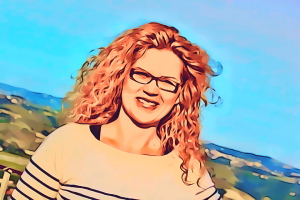163 Letter from Anna Irimiás

Dear future women tourism researchers,
At the time of writing this letter to you I am 43 years old, and have been in academia for over 15 years. When I think about what I might have done differently in my professional life, the piece of advice I would give to my younger self is: trust your capabilities and be strategic.
I am the first person in my family to obtain a university degree. A degree awarded in a foreign country. My parents are exceptionally hard workers who taught me to “get the work done” and to be humble. But doing research was something they found hard to see as a “real” job. My talent was first recognized by one of my professors, Pasquale Fornaro, who said: “Anna, you are a born researcher, you have what it takes.” However, it took me years to truly believe this. I have always been grateful to my professors, excellent academics, who supported me. It was Prof. Fornaro who suggested that I should do a PhD. Another person who saw potential in me was Gábor Michalkó, meeting him at a conference in Rome was a turning point in my career. He opened my eyes to the fact that it is possible to observe and approach tourism issues from different disciplines, and this has proved an ongoing fascination for me. Gábor inspired me to plunge into tourism research. However, I still remember the time when I felt that I wasn’t good enough to publish in the top international journals. I was longing to join the ongoing discussions in the journals I was reading, but didn’t think I was up to it: my research findings were not interesting enough, “others” were much better informed and qualified than me.
Then, again at a conference in Italy, I met the most important person in my life, my husband. It was him suggesting that I should send my work out. After all, if it is rejected, he said, you are the only one that will know (and the reviewers and the editor, of course, but they are not keeping notes!). My husband is not an academic, as you may have guessed yet. Our daughter was just a few months old, and I had been writing a paper at the kitchen table while she slept. Luckily, I received highly critical but positive and constructive reviews, and the paper was published. I remember that I was incredulous but so happy! Ten years have passed and now I join the discussions in top tier journals with confidence. This is also because I am fortunate enough to have the opportunity to work, and to have deep, informed and stimulating conversations with wonderful colleagues and friends like Serena Volo, Ariel Mitev, Gábor Michalkó and Dallen J. Timothy. These conversations have a huge impact on both my thinking and my research.
Here are a few things that I have learnt over the years, you might find useful:
- You are not your work. The manuscript is being judged, not you as a person. Do not take that criticism personally.
- Give yourself a work schedule. Start your day with a 30 minute work block when you actually write something new (not editing or checking references).
- Commit to deadlines.
- Do not procrastinate, be like Nike: Just do it!
- Visualise your project finished whether it is a conference presentation, a paper or a book. Imagine the moment when you are holding the finished product in your hand.
- Identify what is unique about your work, in one sentence write it down just for yourself.
- When you are working on something new, find and carefully examine an example of the paper you are attempting to write.
- Save your energy for your creative work: no small talk or social media.
- Work with colleagues you trust and respect. Avoid toxic relations and workplaces.
- Celebrate every small success: a finished paragraph? Celebrate it!
This book includes many letters from our outstanding current women tourism researchers: what great company we have in our field! It gives a kind of comfort to know that they are out there. I hope that in any difficult moments you face, you will find solace and inspiration in these letters and stories.
And always remember, attending a conference can change your life!
My very best wishes to you,
Anna Irimiás
Corvinus University of Budapest, Hungary

